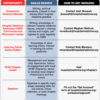Policy Experts Urge Hospitalists to Get Involved, Share Knowledge
SAN DIEGO — Think beyond your four walls, speakers told hospitalists at HM16. When it comes to public health and public policy, with your experience and knowledge, your input is simply too valuable not to share, they said.
During several sessions at the SHM annual meeting, hospitalists were urged to understand that they could influence the world of healthcare beyond their own patients and their own centers.
“You have more power than you realize,” U.S. Surgeon General Vivek Murthy, MD, MBA, told hospitalists in his opening address. As a hospitalist at Brigham and Women’s Hospital in Boston, Dr. Murthy created the nonprofit organization Doctors for America, which promotes affordable, high-quality healthcare for all Americans.
A member of Congress, he said, once told him that a call from a doctor is listed as “a notable event” and 10 calls from doctors in a day is “a full-blown crisis.” “I’m often struck by how infrequently elected leaders hear from doctors,” Dr. Murthy added. “I’m also struck by how many good ideas I hear from doctors.”
Dr. Murthy suggested that as the HM movement grows, hospitalists should ask themselves questions around issues of leadership, change, and public health.
“Can hospitalists leverage their leadership in the hospital to not only improve systems but also create a culture that supports healing in health?” Dr. Murthy asked. “Can hospitalists be as powerful a force for change outside the hospital as they are inside the hospital, recognizing that critical drivers of illness like nutrition, safety, and physical activity are most often grounded in the community rather than the clinic? As people who often mentor trainees and younger physicians, can we inspire the next generation of physicians with a broader vision of medicine, one where physicians’ sacred duty is to safeguard the health of their community by treating illness but also by preventing it?”
Achieving such goals might be a tall order. When asked about how influential they feel in the world of public health, some hospitalists said they feel they can have some impact in their daily work but, beyond the hospital, not so much.
“I don’t feel very empowered,” said Janna Gelderman-Moffett, DO, a locum tenens physician in Boulder City, Colo. She added, though, that she is “frustrated with how medicine is portrayed.”
Robert Wachter, MD, MHM, chief of the division of hospital medicine at the University of California, San Francisco Medical Center, who coined the term “hospitalist” 20 years ago, told hospitalists at HM16 that it’s “crucial” for them to take on new roles. But he also waved a caution flag: too much and you may go too far afield.
“We have to be careful about scope creep,” Dr. Wachter said. “And as much as I enjoyed the Surgeon General’s comments, I think we’ve got to be thoughtful about taking on [too much responsibility]. I have people in my group who do a lot of work, for example, in population health. That’s part of their job, but I’m not sure that’s our job, to fix the world of prevention outside of the hospital and SNF. If we begin becoming something for everybody, I think we’ll lose the special focus that made us successful.”
Ron Greeno, MD, FCCP, MHM, chief strategy officer for IPC Healthcare in North Hollywood, Calif., chair of SHM’s Public Policy Committee, and an SHM board member, said the society and hospitalists are “specially suited” to give input to help shape the details of the Medicare Access and CHIP Reauthorization Act of 2015 (MACRA), which replaced the repealed Sustainable Growth Rate (SGR) formula.
With MACRA, SGR’s threat of broader Medicare payment cuts is eliminated, but it increases the scope of quality measurement, including resource use and clinical-improvement practices. It also uses incentives to push providers toward risk-based models.




